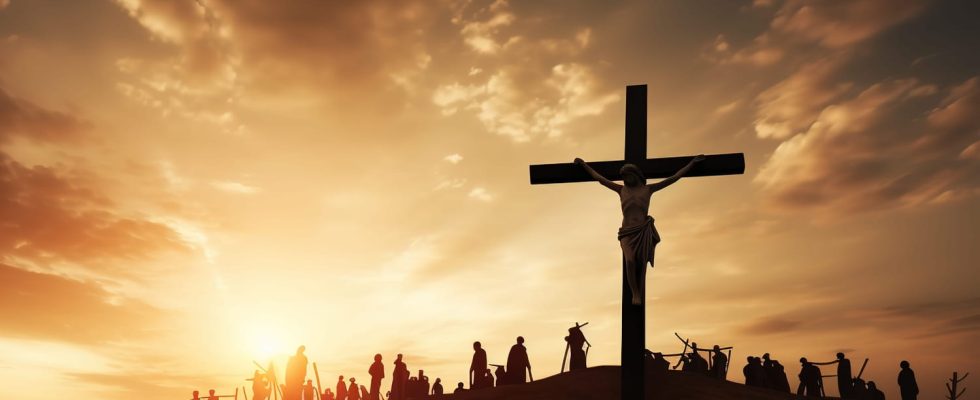GOOD FRIDAY. Public holiday in Alsace and Moselle, the faithful are encouraged to “celebrate” the death of Jesus Christ on the cross and not to eat meat this Friday, March 29, 2024.
[Mis à jour le 25 mars 2024 à 18h43] Good Friday on March 29, 2024 is “celebrated” the death of Jesus Christ on the cross. Betrayed by his disciple Judas, Jesus Christ is arrested by the Romans and condemned by Pontius Pilate, prefect of the Roman province of Judea. He was then executed on the cross after having suffered floggings, torture and humiliation along the path leading him to the hill of Golgotha, loaded with a heavy cross, the crown of thorns pressed on his head.
The preceding Good Friday Easter is a public holiday for only some of the inhabitants of France. These are employees of the historic region of Alsace and the department of Moselle who are governed by local law responding to the ordinance of August 16, 1892 in Strasbourg, in application of the organic law of the Reich. Thus, Good Friday rhymes with the closure of stores and shopping centers in these departments.
What is the place of Good Friday in the Easter calendar? And its meaning? Good Friday in Alsace, Good Friday Meal… More details in this file.
For Christians, Good Friday not only marks the day before the Sunday of Easter. It symbolizes the way of the cross of Jesus Christ, his crucifixion and his death. Enough to link it to the meanings of the meetings of the Easter Monday, Maundy Thursday or Holy Saturday, commemorating different episodes in the life of Christ for believers. In the symbolism of Good Friday, there is the DNA of Christianity: the death of Christ and faith in his resurrection cement a basis that brings together all Christians, whether Catholic, Protestant or Orthodox. As it is a day of sadness and contemplation, Catholic churches have the custom of veiling crucifixes until the Easter vigil of Holy Saturday.
Why in mainland France is Good Friday a public holiday only in Alsace and Moselle? This exception dates back to 1871, with the annexation by the German Empire of the two French territories. The Germans then put in place via an order the public holiday of Good Friday, a religious holiday celebrated until then. When Alsace-Moselle was attached to France, after 1918, local law was maintained.
If in France, Good Friday only turns into a holiday in Alsace and Moselle and in certain overseas territories where the municipalities have Protestant or mixed churches (Guadeloupe, Martinique, Guyana and French Polynesia), this moveable festival celebrated on separate dates by the different Christian Churches nevertheless remains a public holiday in almost all countries with a Protestant Christian tradition (Germany, Finland, Canada, Netherlands, Angola, United Kingdom, New Zeeland, Switzerland)… The “Good Friday holiday” or Good Friday holiday marks the public holiday of Good Friday in many latitudes.
Why does this event mark a special date in Alsace? What anecdotes are attached to it? In Alsace, Good Friday has a special meaning. On that day, the faithful rushed en masse to Protestant churches. Even those who are rarely in the habit of setting foot there: they are nicknamed “Good Friday Christians”.
They thus act against the grain of Catholics who favor Easter as a holiday of obligation – because it represents the resurrection of Christ – and not the day symbolizing the death of their Messiah. For the record, the French historian Alfred Wahl recounts that in certain mixed villages in Alsace, Catholic peasants purposely brought in the manure on Good Friday in front of their fellow citizens in their Sunday best… when the latter paid them back by working voluntarily on August 15, the feast day ofAssumption.
The Good Friday prayer is a universal prayer. On this day, the faithful pray for the Church, for the Pope, for the clergy and the faithful people, for the catechumens, for the unity of Christians, for the Jewish people, for other believers, for those who do not know God, for public authorities and “for our brothers in trial” in general. Different versions of Good Friday prayers also exist, including that “for the deliverance of souls from purgatory”.
Already, many families (practicing or not) do not consume meat on this day, in memory of the symbolic date of the crucifixion of Christ, in France and elsewhere. When Protestants do not give dietary penance instructions, Catholics encourage fasting. For the Orthodox either, Good Friday is not particularly a day of fasting. Eating fish is often in the spotlight among Catholics on Good Friday (and Friday in general). And for good reason: eating fish is “eating lean”. Some parishes invite their faithful to share even more frugal meals, such as a bowl of rice accompanied by an apple. If the fast continues a priori (we are still in the period of Lent, which will not end until the next day), it can be accompanied or replaced by various practices such as good deeds. On the menu of many Catholic school canteens, it is customary to eat only a simple bowl of rice in exchange for funds donated to a charity.
Good Friday 2024 takes place this Friday, March 29, two days from the Sunday of Easter, as is the case every year. This year 2024, Easter Sunday is scheduled for March 31.
Good Friday always takes place two days before the end of Lent, with Easter Sunday. But why on earth does the date of Good Friday move so much from year to year? As a date associated with Easter Day, it depends on the place of this religious holiday in the calendar. Did you know that Easter was set on the first Sunday after the full moon starting March 21? But whatever the year and the day on which Christians celebrate it, Good Friday remains a special date of Holy Week: the one which leads to Resurrection Sunday or Easter Sunday.
